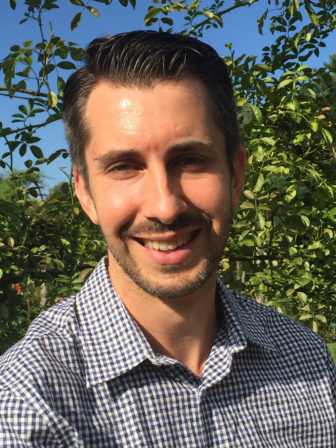
Rawpixel.com/Shutterstock
.
Having relationships with resourceful, knowledgeable individuals is important for the college success of young people with foster care histories. Put more simply, relationships with the right people matter.
Education researcher Ricardo Stanton-Salazar, who writes about the importance of social connections for students who are underrepresented in higher education, describes characteristics of individuals who are particularly influential. These are people who are not related to students, who occupy a position of high status and authority, and who can link students to resources (tangible and intangible) that are highly valued.
Stanton-Salazar calls these people institutional agents. In high school, these are individuals like guidance counselors, teachers, adult mentors and caseworkers. These professionals can use their knowledge to help with selecting colleges and competing applications, draw on personal experience to serve as a cultural guide to college, use their position to advocate for students and link students to valuable resources.

Nathanael J. Okpych
In college, these can be people like the ones mentioned above or individuals on campus (e.g., counselors, deans, professors, etc.). They guide students, help them organize their time, make sure they have money for books and a place to stay during breaks, link them to academic resources so they do well in class and help them navigate the logistical tasks of college (e.g., reapplying for financial aid). Institutional agents are invested in the students’ success and have the knowledge and resources to make a difference.
The importance of institutional agents was demonstrated in a recent study of more than 700 young people in California foster care. The researchers investigated several different types of social relationships to see what was important for increasing the chances that foster youth enrolled in college by age 19/20. A measure for institutional agents was created that included individuals who the youth named as someone who could be relied on for advice and/or practical help (e.g., a ride, borrow money) and who had gone to college. These were people like their high school teachers, guidance counselors, child welfare workers, mentors, therapists and non-relative foster parents.
At age 17, only 46% of the study participants had nominated an institutional agent. The researchers found that each additional institutional agent that youth had increased the probability of enrolling in college by about 8 percentage points. Youth with more institutional agents reported having more help with the college application process, which explained their increased chances of enrolling in college.
Importantly, the number of people youth could turn to for emotional support did not predict their odds of enrolling in college. Neither did the total number of people they could turn to for support. These findings underscore the importance of having specific types of people equipped to help with college, and that we cannot assume that all foster youth have relationships with these people.
Why are relationships important for college success of foster youth? College is challenging for most students. Some students come from families where college knowledge like “make sure you emphasize X, Y and Z in your admissions essay” and “remember to go to office hours” is tacit knowledge passed down like an uncle’s BBQ sauce recipe.
However, many foster youth will be the first in their families to attend college, and this makes it a particularly unknown and daunting place. The question of “Do I really belong here?” is perpetually lingering. Following several disruptive school changes, some foster youth will be academically underprepared for college-level work. People serving as institutional agents to foster youth can help them carve out a plan, teach them tacit survival strategies, lift them up when they are flooded with doubt and point them to valuable resources on campus. Institutional agents can be like turning on a light in a dark room.
Another reason relationships are important is because college students with foster care histories are often in more dire and precarious circumstances than their peers. For example, it is not guaranteed that students have a place to live when the dorms close. The patchwork of financial aid (e.g., Pell grants, Education and Training Vouchers, remaining in foster care beyond age 18) that makes college affordable for many foster youth is contingent on them making satisfactory academic progress.
This commonly entails enrolling in a certain number of credits and maintaining a GPA of 2.0 or better. If students slip up academically, their financial support for college could be in jeopardy. Thus, institutional agents who can learn about academic difficulties in real time and have the knowledge to refer foster youth to helpful resources might help them avert this financial support death spiral.
Potential people who can help
There are several reasons why young people with foster care histories may not have access to adults who could reliably serve as institutional agents. For example, many adolescents in care experience multiple placement changes, which are sometimes accompanied by changes in schools. Constantly moving around can make it extremely challenging to form and maintain relationships with teachers, high school guidance counselors and other school professionals.
Even if youth remain at the same school, guidance counselors are often crippled by the sheer number of students they are responsible for. On average, U.S. high school guidance counselors are responsible for more than 480 students. And in low-resourced high schools, counselors usually have many other things competing for their time other than college advising. Thus, it can be a feat to form a sustained relationship with a counselor.
Child welfare caseworkers are also potential institutional agents. I remember speaking with many young people who described how their tough-love foster parent or their caseworker had a big influence on why they were in college. But this is probably the exception rather than the rule. Older adolescents in foster care typically live in more than one placement, and child welfare worker turnover is notoriously high.
Limited access to available and invested individuals is one challenge to cementing relationships with institutional agents. The lasting effects of trauma is something else that can inhibit relationships from forming. Several studies that have interviewed young people who are or were in foster care tell tales of broken relationships. As a result, some young people become emotionally guarded, distrustful of relationships and highly reliant on themselves. As one youth put it in a study interview: “[Foster care] affects my ability to wanna latch on to somebody, because every time it seems like I’ve latched on to someone, I lose them … And it really tears me apart every time it happens. I take it harder than I should. So, it really affects me, so it jus’ feels like I haven’t really been tryin’ to latch close to people as much as, you know, one would. Jus’ because of everyone that I’ve lost. I don’t know how to deal with it. It’s hard.”
A recent study of more than 300 young people in foster care underscored the toll that trauma-related emotional guardedness and self-reliance can have on the college outcomes of foster youth. The researchers found that, for foster youth who went to college, being more emotionally guarded and self-reliant hurt their chances of persisting to the second year in college and ultimately graduating. This was explained in part by these young people having less support from their social connections.
This is a challenge for adults who see foster youth who could benefit from help and are eager to give them time, information and encouragement. Their interest may not be reciprocated. This is understandable from the perspective of the young people, who have learned that relationships can be disappointing, painful and even dangerous.
Some ideas about what can be done
One of the great challenges I see in our attempt to promote college success for foster youth involves cultivating relationships that youth have with people who genuinely care about them, are willing to invest in them and have the knowledge and resources to help them. There have been some promising efforts.
For example, natural mentoring programs strive to strengthen relationships that youth already have with individuals in their lives. Picking mentors who have gone to college and equipping them with training around supporting foster youth into and through college would augment these programs. Linking foster youth who are starting college with a peer mentor who is a few years ahead of them is another promising practice. With the right training and supports, this relationship can help the incoming student to navigate college.
Developing specialized child welfare care workers with expertise in college entry and persistence can also link youth with a valuable resource. Another promising development is campus-based support programs at colleges, which are specialized programs for students with foster care backgrounds that provide an array of financial support, advising, referral and mentoring services. These programs, which have blossomed over the past decade, often create communitylike or familylike support networks among the participants. Finally, addressing underlying trauma that could stymie relationship formation is a high priority.
College is a place that values, promotes and in many ways, expects independence of students.
What this means is that most colleges take more of a light-touch approach to supporting students than an all-hands-on-deck approach. This is especially the case in two-year and community colleges.
As Margaret Mead once famously said, “One of the oldest human needs is having someone to wonder where you are when you don’t come home at night.” We need to apply a similar principle to support young people with foster care histories into and through colleges. We should aim to ensure that each youth has invested, competent and capable people who worry about them and will do everything they can to ensure they make it through college.
Nathanael J. Okpych is an assistant professor at the University of Connecticut’s School of Social Work. He studies the transition to adulthood for young people in foster care, focusing on secondary and postsecondary educational attainment, social support and mental health.





























